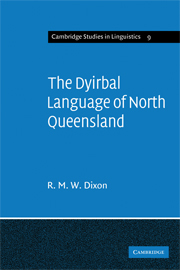Book contents
- Frontmatter
- Contents
- List of maps and plates
- Acknowledgements
- Preface
- Abbreviations and conventions
- 1 AUSTRALIAN LANGUAGES
- 2 DYIRBAL: THE LANGUAGE AND ITS SPEAKERS
- 3 WORD CLASSES
- 4 SYNTAX
- 5 DEEP SYNTAX
- 6 MORPHOLOGY
- 7 PHONOLOGY
- 8 SEMANTICS
- 9 LEXICON
- 10 PREHISTORY
- APPENDIX A DYIRBAL LOGIC
- APPENDIX B PREVIOUS WORK ON DYIRBAL
- TEXTS
- VOCABULARY
- LIST OF DYIRBAL AFFIXES
- REFERENCES
- INDEX OF AUSTRALIAN LANGUAGES
- Plate section
- Frontmatter
- Contents
- List of maps and plates
- Acknowledgements
- Preface
- Abbreviations and conventions
- 1 AUSTRALIAN LANGUAGES
- 2 DYIRBAL: THE LANGUAGE AND ITS SPEAKERS
- 3 WORD CLASSES
- 4 SYNTAX
- 5 DEEP SYNTAX
- 6 MORPHOLOGY
- 7 PHONOLOGY
- 8 SEMANTICS
- 9 LEXICON
- 10 PREHISTORY
- APPENDIX A DYIRBAL LOGIC
- APPENDIX B PREVIOUS WORK ON DYIRBAL
- TEXTS
- VOCABULARY
- LIST OF DYIRBAL AFFIXES
- REFERENCES
- INDEX OF AUSTRALIAN LANGUAGES
- Plate section
Summary
In Dyirbal, syntactic relations are marked by case inflections and not by word order; word order is remarkably free. There is a statistically most frequent order (7.8) and this is as a rule followed in the examples below (some of the simpler examples are made up, but all have been thoroughly checked with speakers). It should be borne in mind that in almost all cases the words could be arranged in any order.
Simple sentences
Involving nominals: nominative-ergative construction. There are two types of simple sentence in Dyirbal – transitive and intransitive. If only nominals are involved, then the words in an NP functioning as intransitive subject [S] or transitive object [O] receive nominative inflection, and the words in an NP functioning as transitive subject [A], ergative inflection:
(24) bayi yara baniɲu man is coming
(25) balan dugumbil baniɲu woman is coming
(26) balan dugumbil baŋgul yaraŋgu balgan man is hitting woman
(27) bayi yara baŋgun dugumbiru balgan woman is hitting man
It should be noted that the exemplificatory sentences given in this and other chapters are always grammatically correct, but are usually as ‘wooden’ as their English equivalents. Informants often suggested substituting ‘his wife’ for ‘woman’, giving a reason for the action, and generally making the sentences more interesting (see Samarin, 1967: 37). We have kept them simple so as to be able to illustrate the grammatical points without burdening the reader with lexical detail. […]
- Type
- Chapter
- Information
- The Dyirbal Language of North Queensland , pp. 59 - 124Publisher: Cambridge University PressPrint publication year: 1972



